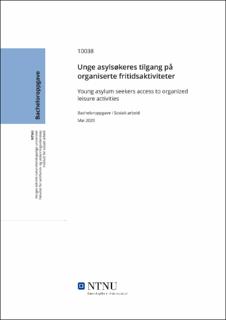| dc.contributor.advisor | Moufack, Marie Florence | |
| dc.contributor.author | Stenmark, Sigrid Andersen | |
| dc.date.accessioned | 2021-09-28T18:43:50Z | |
| dc.date.available | 2021-09-28T18:43:50Z | |
| dc.date.issued | 2020 | |
| dc.identifier | no.ntnu:inspera:56776074:22064491 | |
| dc.identifier.uri | https://hdl.handle.net/11250/2785625 | |
| dc.description.abstract | Ifølge norsk lov og barnekonvensjonen skal alle barn i Norge ha rett til å delta i fritidsaktiviteter, men likevel kan sårbare grupper som unge asylsøkere havne utenfor og ikke få delta på lik linje med andre barn. I denne oppgaven vil jeg undersøke hvilke forhold som fremmer og hemmer deltakelse i organiserte fritidsaktiviteter for unge asylsøkere ved bruk av litteraturstudie som metode. Jeg tar i bruk sosial kapital og Bronfenbrenners utviklingsøkologiske teori for å belyse dette ytterligere. Det er mange ulike forhold som har innvirkning på unge asylsøkeres tilgang til organiserte fritidsaktiviteter. Resultatene mine viser at ressurser i lokalsamfunnet, godt samarbeid med fritidsarenaer utenfor mottaket, felles kjøreordninger og økonomiske virkemidler kan fremme deltakelsen. Som motsetning til dette vil dårlige samarbeid, mangel på organiserte transporttilbud, lav økonomi og dårlige forhold i mottakene hemme deltakelsen. Andre forhold som spiller inn, er asylsøkernes oppholdsstatus og psykiske helse. Tilgangen til fritidstilbudet vil også variere fra mottak til mottak ut ifra hvordan mottakene distribuerer budsjettene sine og hvor mottaket ligger. I tillegg ser man at sportsaktiviteter kan vær ekskluderende, men samtidig kan skape sterkere bånd innad i gruppene som deltar. Det synes også at å delta i organiserte fritidsaktiviteter kan bedre unge asylsøkernes psykiske helse, skape rom for integrering, identitetsutvikling og øke deres sosiale kapital. | |
| dc.description.abstract | According to Norwegian law and the convention on the rights of the child, children in Norway have the right to participate in leisure activities. Nevertheless, vulnerable groups such as young asylum seekers can get excluded and do not get to participate at the same rate as other children. In this thesis, I want to investigate which circumstances that promote and inhibit participation in organized leisure activities for young asylum seekers by using literature studies as a method. I will use theories about social capital and Bronfenbrenner’s ecological system theory to give more insight into this theme. Many different circumstances affect young asylum seekers access to organized leisure activities. My results show that resources in the local community, good cooperation with leisure activities outside of the reception centres, organized carpools, and economic measures, can promote participation. On the contrary to this, lack of cooperation and organized transport services, low income, bad conditions in the reception centres, will inhibit the participation. Other circumstances that may affect participation are the asylum seekers residency status and their mental health. The access to leisure activities will also vary from reception center to reception center depending on how they distribute budget and where they are located. In addition to this it is shown that sports activities can have excluding factors, but at the same time can create stronger bonds between the asylum seekers and the rest of the participants. Participation in organized leisure activities will better young asylum seekers mental health, make room for integration, identity development, and increase their social capital. | |
| dc.language | | |
| dc.publisher | NTNU | |
| dc.title | Unge asylsøkeres tilgang på organiserte fritidsaktiviteter | |
| dc.type | Bachelor thesis | |
